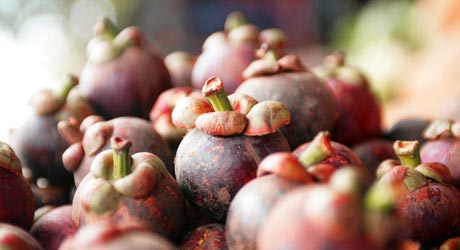
What are xanthones?
Xanthones are biologically active plant phenols found in a few select tropical plants. Current research on xanthones suggests they are beneficial in helping with many conditions including: allergies, infections (microbial, fungus, viral), cholesterol levels, inflammation, skin disorders, gastro-intestinal disorders, and fatigue.
Xanthones have been found to support and enhance the body's immune system. Xanthones also exhibit strong antioxidant activity which is beneficial for neutralizing free radicals in the body.
Facts about xanthones:
• The most plentiful natural source of xanthones is the mangosteen (Garcinia mangostana), which contains over 30 xanthones. The mangosteen has by far the most xanthones of any plant. The pericarp of the mangosteen fruit contains the vast majority of the xanthones.
• Xanthones are some of the most potent antioxidants known. It is thought to be more potent than both Vitamin C and Vitamin E. In fact, many doctors refer to xanthones as "Super Antioxidants."
• Xanthones are heat stable molecules. Unlike proteins, they won't denature or lose their structure when heated.
Published Journal Research on Xanthones
Visit www.pubmed.com ( type search xanthones )
http://www.ncbi.nlm.nih.gov/sites/entrez/
List of Xanthones in Mangosteen
Here is a list of all of the xanthones found in mangosteen that have been named. There are others that have not been named yet that I have not included in this list. Currently, there are 43 xanthones known to be in the mangosteen.
BR-xanthone A
BR-xanthone B
Calabaxanthone
Garcinone A
Garcinone B
Garcinone C
Garcinone D
Garcinone E
Gamma-Mangostin
Garcimangosone A
Garcimangosone B
Garcimangosone C
1-Isomangostin
3-Isomangostin
1-Isomangostin hydrate
3-Isomangostin hydrate
Gartanin
Demethylcalabaxanthone
Maclurin
Mangostenone
Mangostanin
Mangostanol
Mangostin
Mangostinone
Mangostinone A
Mangostinone B
a-Mangostin
b-Mangostin
g-Mangostin
Norathriol
Tovophyllin
Tovophyllin A
Tovophyllin B
Trapezifolixanthone
Medical Properties of Xanthones:
Research on Xanthones is ongoing. There are many results people report about health benefits from xanthones that cannot be explained by the science yet. This is likely due to the fact that only about 15% of known xanthones have been studied to any degree.
Some of the known benefits of xanthones based on recent research are:
• Anti-Fatigue - Helps boost energy.
• Anti-Inflammatory - Helps prevent and reduce inflammation
• Anti-Aging
• Helps prevent cancer. According to a preliminary study, six xanthones have been found to be capable of killing cancer cells.
• Helps lower blood pressure
• Helps lower blood sugar. Many people with type II diabetes have reported that it helps them to regulate their blood sugar levels.
• Helps prevent infections - Bacteria, Microbes, Viruses, Fungus.
• Anti-Diarrheal - In folk medicine, the pericarp of the mangosteen (most potent source of xanthones) has been used for centuries to effectively treat dysentery.
• Anti-Parkinson, Anti-Alzheimer. Helps prevent dementia.
• Anti-allergenic - Helps with allergies
• Eye Care - Helps prevents cataracts and glaucoma
• Helps protect the heart and cardiovascular system
• Anti-Obesity
A recent study has confirmed that gamma mangostin, a xanthones derivative found in the mangosteen, is a potent COX (Cyclooxgenase) 2 inhibitor. The COX 2 enzyme is a chemical in the body that causes inflammation. This enzyme is commonly found in people suffering from joint pain and arthritis. However, it is also being found with other diseases as well, that are not as obvious, such as Parkinson's, Alzheimer's, cancer, and Diabetes. In three separate studies, a xanthones derivative of the mangosteen slowed down the body's production of the COX 2 enzyme.
Recommended Dosages
Many of the current products which contain xanthones are in a liquid form. Therefore, the following recommendations are based on taking a liquid form of a whole fruit mangosteen puree (be sure it includes the pericarp) . Pills and capsules are generally less effective and are therefore not recommended.
Please consult with your doctor before beginning any dietary regiment.
For people in good health, the recommended maintenance dose is 1-2 oz per day. If you are regularly in an unhealthy environment (i.e. smoke filled bars, cities with heavy smog, etc.) then taking more is recommended due to the antioxidant power of xanthones.
The general rule of thumb if illness or disease is already present is 1-3 ounces before every meal with 2 ounces being the most common.
Here are some specific recommendations from Dr. J Frederic Templeman M.D.
• Asthma - 1oz 3 times daily
• Allergies - 1 oz before every meal during allergy season.
• Heart Attack & Stroke - 1-2 oz before meals for existing disease 1oz per day for prevention
• Fibromyalgia - 1-2 oz before every meal
• Diverticulitis - 1 oz per day - Preparation should be strained before drinking
• Chronic Obstructive Pulmonary Disease - 1oz three times a day when symptoms present 1oz per day for prevention
• Multiple Sclerosis - 1-2oz 2-3 times a day.
• Cancer - 2-3oz 2-3 times a day if cancer is present 1oz 1-3 times a day for prevention. (In some cases, people have drank up to 25oz per day)
• Type II Diabetes - 1 ounce a day three times daily until results are noticed. Then slowly reduce to 1oz daily.
For more information, please contact me.


No comments:
Post a Comment